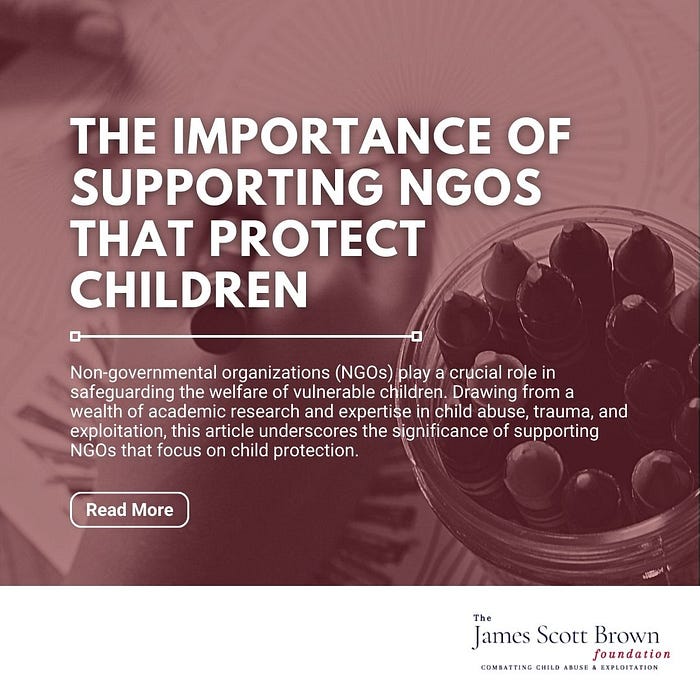The Importance of Supporting NGOs That Protect Children by James Scott Brown Foundation
by James Scott Brown Foundation

Abstract:
Non-governmental organizations (NGOs) play a crucial role in safeguarding the welfare of vulnerable children. Drawing from a wealth of academic research and expertise in child abuse, trauma, and exploitation, this article underscores the significance of supporting NGOs that focus on child protection. The following discourse highlights three key reasons to bolster these organizations and delineates practical methods for offering assistance.
1.Direct Impact on At-Risk Children:
NGOs working in child protection directly intervene to ameliorate the lives of children experiencing maltreatment, exploitation, or neglect. Comprehensive support services, such as emergency shelters, legal assistance, and mental health care, provide immediate and tangible benefits to affected individuals (Kis-Katos et al., 2019).
2. Implementation of Prevention Programs:
By fostering community-based prevention initiatives, NGOs contribute to the reduction of child abuse and exploitation. Educational programs targeting parents, teachers, and children themselves can cultivate awareness and equip individuals with the tools necessary to identify and address potential risks (Pinheiro, 2006).
3. Advocacy and Policy Influence:
Child-focused NGOs play a vital role in shaping public policies and legislation that protect vulnerable children. Their advocacy efforts and data-driven research can inform policymakers, leading to the adoption of comprehensive legal frameworks that prioritize child welfare (Heymann et al., 2013).
Ways to Support NGOs:
- Financial Contributions: Monetary donations allow NGOs to sustain and expand their programs, reaching a greater number of children in need.
- Volunteering: Offering time and expertise to these organizations can augment their capacity to implement effective interventions.
- Public Awareness: Raising awareness about the work of child-focused NGOs within social circles and networks can attract additional supporters and resources.
- Collaboration: Encouraging partnerships between NGOs, local institutions, and government agencies can strengthen the collective impact on child protection.
Conclusion:
Supporting NGOs dedicated to child protection yields manifold benefits, encompassing direct interventions, prevention programs, and policy influence. By understanding the importance of these organizations and actively contributing to their efforts, a profound impact can be made on the lives of vulnerable children worldwide.
References:
Heymann, J., McNeill, K., & Earle, A. (2013). Protecting childhood and enabling adulthood: innovative, interdisciplinary, and participatory approaches to understanding and addressing children’s rights. International Journal of Children’s Rights, 21(1), 1–16.
Kis-Katos, K., Pieters, J., & Sparrow, R. (2019). The impact of targeted NGO support on child health in Indonesia. Health Economics, 28(12), 1453–1470.
Pinheiro, P. S. (2006). World Report on Violence against Children. United Nations Secretary-General’s Study on Violence against Children. United Nations, Geneva.
Read more at the James Scott Brown Foundation.
Comments
Post a Comment